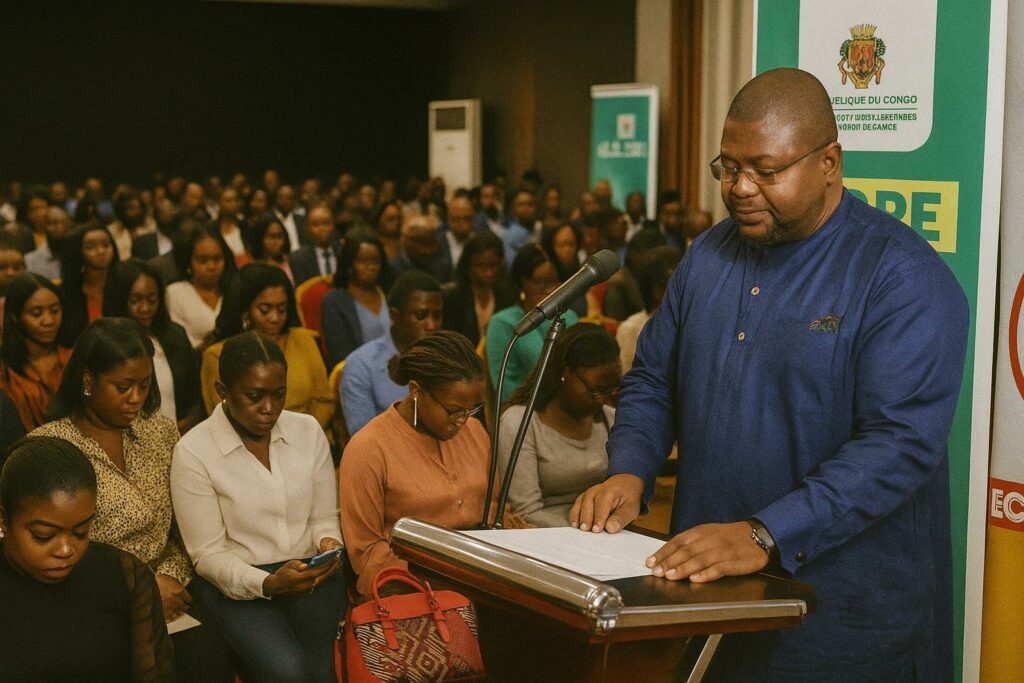Celebrating MSME Day in Brazzaville
While the United Nations annually earmarks 27 June as Micro, Small and Medium-Sized Enterprises Day, Brazzaville chose 28 June 2025 to translate the commemoration into concrete pedagogy. In the chandelier-lit halls of the Grand Lancaster Hotel, more than three hundred participants—from parliamentarians to hip-hop artists—converged for a master class titled “How to Create, Manage, Finance and Grow Your Enterprise.” The symbolism was hardly lost on observers: by coupling an international calendar event with a domestic capacity-building exercise, the Republic of the Congo signalled that the private sector is no longer a rhetorical afterthought but a central plank of its development narrative.
Institutional Backing for Entrepreneurial Growth
Presiding over the opening and closing sessions, Rudy Steph Mpiéré Gouamba, Director-General for Small and Medium-Sized Enterprises, framed the day as an inflection point. He recited macro-economic indicators—an expected 4.5 percent GDP growth in 2025 (African Development Bank 2024) and a hydrocarbons windfall being channelled toward diversification—to argue that “the stars are aligned for indigenous enterprise”. His department’s decision to waive several licensing fees for start-ups under a revised investment code was highlighted as evidence that regulatory modernisation is not merely aspirational.
Demystifying Business Registration
Didace Ngafoula-Ganao, Brazzaville’s departmental director for SMEs, deconstructed the city’s entrepreneurial ecosystem, stressing the newly operational one-stop shop that compresses company registration into forty-eight hours, in line with guidelines promoted by the World Bank’s Doing Business agenda (World Bank 2023). Participants were walked through digital portals allowing for real-time status updates, a significant leap from the paper-laden queues that once discouraged formalisation.
Financing Pathways in a Diversifying Economy
The conversation soon pivoted to financing—a perennial hurdle for African start-ups. Valery Mpara, inter-departmental director at the Fonds d’Impulsion, de Garantie et d’Accompagnement (Figa), outlined credit-guarantee mechanisms that de-risk lending for commercial banks while capping interest rates for borrowers. Since its recalibration last year, Figa has underwritten CFA 15 billion in start-up loans, with a non-performing ratio below seven percent, a figure commentators described as “encouraging by continental standards” (Economic Commission for Africa 2024).
The Banking Sector’s Evolving Posture
A senior executive from a leading Pan-African bank elaborated on collateral-lite products, including invoice discounting for wp-signup.phped SMEs. He highlighted that Basel-compliant risk assessment no longer equates small clients with high default probability provided that governmental guarantee schemes remain credible. Such remarks mirror the Central Bank of Central Africa’s recent communiqué urging commercial lenders to steer more capital into non-oil sectors.
Youth Engagement and Social Protection
Murielle Koumen of the National Social Security Fund emphasised that entrepreneurial dynamism must dovetail with social resilience. She described a new contributory regime permitting self-employed digital artisans to accumulate pension points, thereby bridging the historical gap between formality and informality. The announcement resonated with the many university students in attendance, who posed incisive questions on balancing risk-taking with future security.
A Dialogic Pedagogy Rooted in Pragmatism
The master class adopted an interactive format that blurred the distinction between lecturer and audience. Entrepreneurs shared case studies of navigating customs procedures through blockchain-enabled platforms, while civil-servant technocrats acknowledged bottlenecks that still require legislative fine-tuning. The atmosphere, according to one participant, was “less chalk-and-talk, more policy-meets-practice,” a pedagogical shift consistent with UNESCO’s advocacy for experiential learning in vocational spheres (UNESCO 2024).
Regional Echoes and Future Outlook
Neighbouring capitals—Libreville, Kinshasa and Luanda—have mounted similar initiatives, yet Congolese officials stress that Brazzaville’s model is uniquely calibrated to the domestic labour market, where 75 percent of jobs are generated by micro-enterprises according to the National Institute of Statistics. Plans are afoot to replicate the master class in secondary cities such as Pointe-Noire and Dolisie, complemented by virtual clinics aimed at the diaspora. Analysts view the scaling-up strategy as consonant with the African Continental Free Trade Area’s objective of knitting together fragmented markets (African Union 2023).
A Measured but Optimistic Coda
By sunset, the hotel foyer buzzed with networking that blended spreadsheets with social media handles. While structural challenges—energy reliability, logistics costs, and market depth—remain, participants departed with a tangible roadmap rather than abstract exhortations. For policymakers, the event fortified the narrative that targeted capacity-building can convert demographic momentum into economic value. For investors, it signalled a polity intent on translating hydrocarbons revenue into entrepreneurial infrastructure. In the diplomatic circles that monitor Congo-Brazzaville’s reform trajectory, the master class was widely read as an incremental yet credible stride toward an inclusive, innovation-anchored economy.

